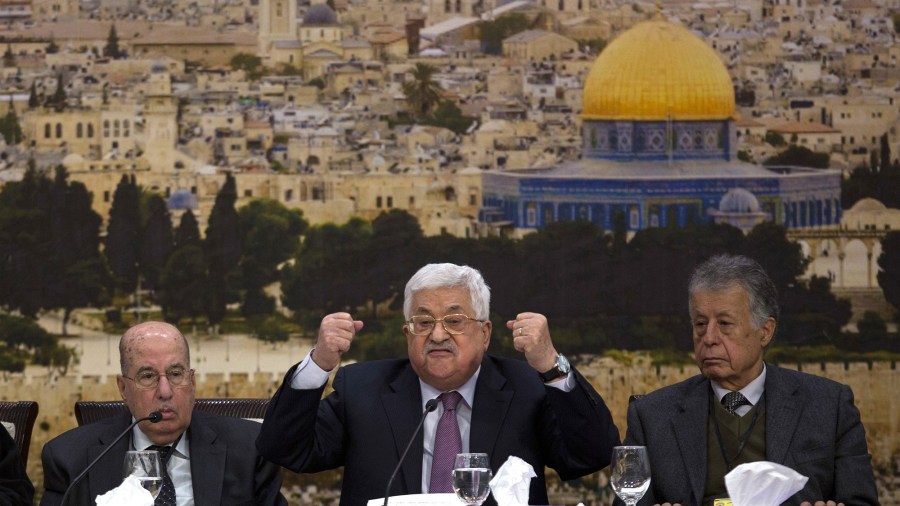
Palestinian President Mahmoud Abbas, center, speaks during a meeting with the Palestinian Central Council, a top decision-making body, at his headquarters in the West Bank city of Ramallah, Sunday, Jan. 14, 2018. (AP Photo/Majdi Mohammed,l)
Pinhas Inbari – How Fault Lines in the PA and the Arab World Affect Jerusalem
h/t The Jerusalem Center for Public Affairs
Institute for Contemporary Affairs
Founded jointly with the Wechsler Family Foundation
- The Ramallah-based Palestinian Authority is experiencing tension with other Palestinian power centers in east Jerusalem, Jenin, Nablus, and Hebron, as well as with other Arab countries.
- The PA has stopped financing east Jerusalem hospitals including Makassed and Augusta Victoria. Al-Quds University in east Jerusalem has requested to join Israel’s Council for Higher Education, leading the PA to fire lecturers from east Jerusalem. Former university president Sari Nusseibeh, known for advocating the integration of east Jerusalem with Israel, was appointed by Abu Dhabi as the head of an economic fund for east Jerusalem that has no connection with Ramallah.
- Arab youth in east Jerusalem are still connected to Ramallah by the Arab cultural events it offers and its good restaurants, but PA officials in Ramallah see the visiting Israeli Arabs and residents of east Jerusalem as “corrupting” the spirit of struggle that the PA wants to nurture among younger Palestinians.
- The PA was particularly incensed by the fact that on the “global day of rage” marking the transfer of the U.S. embassy to Jerusalem in May 2018, east Jerusalem and Israeli Arab youths partied with drinking and dancing in the new West Bank town of Rawabi instead of attacking IDF checkpoints.
- Another cause of tension involves Palestinian and Jordanian fears regarding the intentions of Saudi Arabia toward the Temple Mount. When an emergency delegation from the Waqf in east Jerusalem visited the Gulf and claimed that the Al-Aqsa mosque was in danger, the Gulf leaders answered, “No problem. If the Al-Aqsa mosque collapses, we will build a new one that is much nicer.”
- This answer demonstrates that Saudi Arabia and the Gulf countries perceive the Al-Aqsa mosque as a rival to the holy city of Mecca and do not support it. Saudi Arabia does not provide any assistance to Jerusalem, and the Saudis prevented the Arab League from carrying out a decision to transfer $500 million to east Jerusalem.
|
|---|
|
|
|---|
|
|---|







